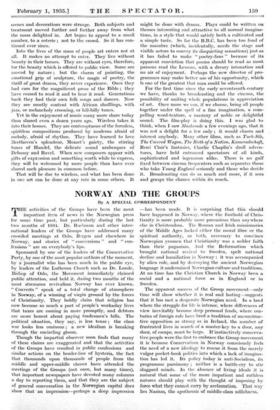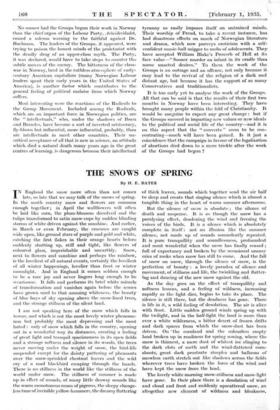NORWAY AND THE GROUPS
By A SPECIAL CORRESPONDENT
THE activities of the Groups have been the most important item of news in the Norwegian press for some time past, but particularly during the last two months of 1931. Dr. Buchman and other inter- national leaders of the Groups have addressed many crowded meetings at Oslo, Bergen and elsewhere in Norway, and stories of " conversions " and " con- fessions " are on everybody's lips.
Sponsored by one of the leaders of the Conservative Party, by one of the most popular authors of the moment, by a journalist who has been much in the public eye, by leadeis of the Lutheran Church such as Dr. Lunde, Bishop of Oslo, the Movement immediately claimed public attention, and held it, during two months of the most strenuous revivalism Norway has ever known. " Converts" speak of a total change of atmosphere in Norway, of a winning of virgin ground by the forces of Christianity. They boldly claim that religion has now beeome so much a part of people's workaday lives that taxes are coming in more promptly, and debtors are more honest about paying tradesmen's bills. The political situation, they say, is less tense ; the class war looks less ominous ; a new idealism is breaking through the encircling gloom.
Though the impartial observer soon finds that many of these claims are exaggerated and that the activities of the Groups have resulted in public confessions and similar actions on the border-line of hysteria, the fact that thousands upon thousands of people from the middle and upper-middle classes have attended the meetings of the Groups (not once, but many -times), that important newspapers have devoted many columns a day to reporting them, and that they are the subject of general conversation in the Norwegian capital does show that an impression—perhaps a deep impression —has been made. It is surprising that this should have happened in Norway. where the foothold of Chris- tianity is more probably more precarious than anywhere else in Christendom. The Roman and Irish missionaries of the Middle Ages lacked either the moral fibre or the spiritual authority, or both, necessary to convince Norwegian yeomen that Christianity was a nobler faith than their paganism. And the Reformation which brought national revival to Sweden, spelt national decline and humiliation in Norway : it was accompanied by alien rule, and by destroying the ancient Norwegian language it undermined Norwegian culture and traditions. At no time has the Christian Church in Norway been a social and a national force as in England or in Sweden.
The apparent success of the Group movement—only time will show whether it is real and lasting—suggests that it has met a desperate Norwegian need. In a land where the struggle for life is intense, where differences of view inevitably become deep personal feuds, where cen- turies of foreign rule have bred a tradition of unconstruc- tive opposition as strong as in Ireland, the number of frustrated lives in search of a master-key to a door, any door, of escape, must be large. If instinctively conserva- tive people were the first to embrace the Group movement it is because Conservatism in Norway consciously feels the need of a new ideology to rescue it from the merely vulgar pocket-book politics into which a lack of imagina- tion has led it. Its policy today is anti-Socialism, its programme parsimony ; neither is a battle-cry to stir sluggard minds. In the absence of living ideals it is natural that some of the more impatient and ruthless natures should play with the thought of imposing by force what they cannot carry by acclamation. That way lies Nazism, the apotheosis of middle-class selfishness. No sooner had the Groups begun their work in Norway than the chief organ of the Labour Party, Arbeiclerbladet, issued a solemn warning to the faithful against Dr. Buchman. The leaders of the Groups, it appeared, were trying to poison the honest minds of the proletariat with the deadly drug of an upper-class myth. The Party, it was declared, would have to take steps to counter the subtle moves of the enemy. The bitterness of the class- war in Norway, bred in the ruthless atmosphere of early- century American capitalism (many Norwegian Labour leaders spent their early years in the United States of America), is another factor which contributes to the general feeling of political malaise from which Norway suffers.
Most interesting were the reactions of the Radicals to the Group Movement. Included among the Radicals, which are an important force in Norwegian politics, are the " intellectuals," who, under the shadows of Ibsen and Brandes, have become a sort of inverted aristocracy, fly-blown but influential, more influential, probably, than are intellectuals in most other countries. Their un- critical acceptance of all that is new in science, an attitude which died a natural death many years ago in the great centres of learning, is dangerous because their intellectual tyranny so easily imposes itself on untrained minds. Their worship of Freud, to take a recent instance, has had disastrous effects on much of Norwegian literature and drama, which now purveys eroticism with a self- confident music-hall snigger to mobs of adolescents. They have accepted William Blake's Proverb of Hell at its face value—" Sooner murder an infant in. its cradle than nurse unacted desires." To them the work of the Groups is an outrage and an offence, not only because it may lead to the revival of the religion of a dark and distant age, but because it has the support of so many Conservatives and traditionalists.
It is too early yet to analyse the work of the Groups. All that can be said is that the results of their first two months in Norway have been interesting. They have brought many people within the fold of Christianity. It would be sanguine to expect any great change : but if the Groups succeed in imparting new values or new ideals to the political and social life of the country—and it is on this aspect that the " converts " seem to be con- centrating—much will have been gained. Is it just a coincidence that the campaign in favour of the legalization of abortions died down to a mere trickle after the work of the Groups had begun ?















































 Previous page
Previous page